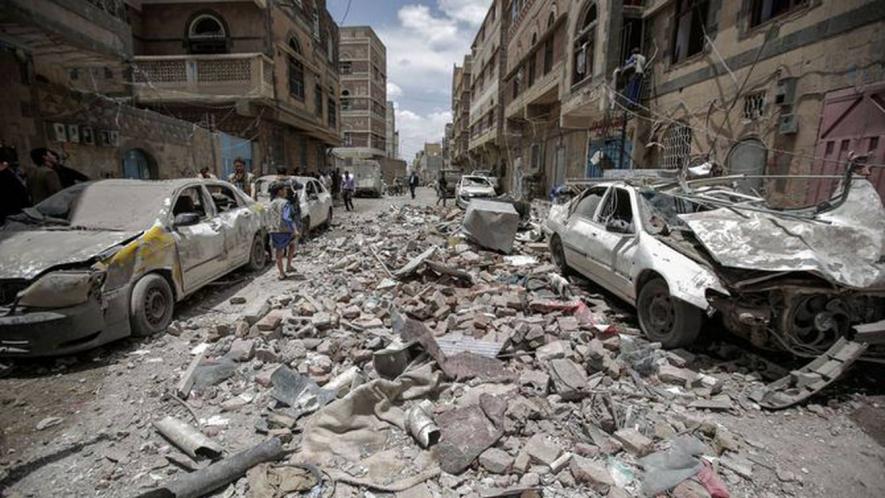
While the world watches Putin’s harrowing invasion of Ukraine, other despots are committing wanton aggression — with UK support
Phil Miller / Declassified UK
(March 2, 2022) — Gross violations of international law. Missiles raining down on houses. Kleptocrats laundering their ill-gotten gains through London and buying political influence. Aggressive, powerful states attacking a poorer neighbour; backing separatist rebels; illegally occupying its land; dropping cluster bombs and conducting crippling cyber-attacks. Sound familiar?
This is what Saudi Arabia and the United Arab Emirates have been doing to Yemen since 2015. It’s a conflict that has continued during Putin’s offensive in Ukraine, but with a fraction of the media scrutiny.
Unlike with Russia, there have been no recent calls for financial or even sporting sanctions on Gulf regimes from prominent British commentators or politicians. With the war in Yemen worsening once again — as Declassified’s new film shows below — the silence of Britain’s political class becomes ever louder.
The double standard has a simple explanation. The despotic rulers of Riyadh, Dubai and Abu Dhabi (the two major emirates in the UAE) are close British allies and reliable customers of Western weaponry.
This January, their jets killed over 90 people in the bombing of a migrant detention centre. It was one of the worst atrocities of the entire Yemen war, which has been marked by countless war crimes and civilian massacres — like we are tragically now seeing in Ukraine.
Amnesty International says a missile fragment found in the detention centre wreckage showed the weapon responsible was made by Raytheon, a US company with factories in Britain. Their equipment has been repeatedly linked to atrocities in in Yemen, including the bombing of a wedding.
Laser guidance systems for Raytheon’s missiles are made at a facility in Glenrothes, east Scotland. I asked the company to show me around the site, but they refused, instead calling the police when I turned up to film outside last month.
The locals were more open, although opinion in Glenrothes is split. Many work for Raytheon and won’t comment. One passer-by said he knew about the war in Yemen but had “nae issues” with the company’s role.
Others were more concerned. Primary school teacher Sharon Rickard said she was “horrified” to hear weapons made in her town might be used on civilians. “I have a friend who works there as an engineer and she’s never really said too much about her job,” she told me. “but maybe that’s why.”

Exiled Artists
An hour’s drive south of Glenrothes is Scotland’s capital Edinburgh, where I met two Yemeni artists. Saber Bamatraf, a pianist, and Shatha Altowai, a painter, fled to Scotland after receiving threats from Yemen’s socially conservative Houthi rebel group, which overran the central government in 2015, sparking the current war.
The married couple are critical of the Iran-backed Houthis, especially for firing crude rockets and drones at Abu Dhabi, capital of the UAE, where several civilians were recently killed.
Yet they are also horrified by the scale of retaliation from Saudi Arabia and the UAE. At least 15 people were killed in an airstrike a few doors down from their old house in Sanaa during the heavy bombing campaign in January.
Watching the latest bombardment unfold via Facebook, Bamatraf said: “Everyone was terrified…it took the people three days in order to get the dead bodies from under the rubble.”
The incident was too upsetting for his wife to talk about. Had Edinburgh University not awarded the couple an artist protection fellowship, they might have been in Yemen’s capital when it happened.
Earlier in the war, another bombardment devastated their property and left them homeless. Even their beloved piano was not spared.
Now settling into life in Edinburgh, Bamatraf told me he is “really shocked” that Raytheon has an arms factory so near his new home. He believes the company’s personnel and shareholders “receive money from a tragedy that’s happening in another part of the world.”
This is something its chief executive Greg Hayes effectively admitted in a recent conference call with investors.

Saudi Arabia also buys fighter jets from Raytheon’s rival, BAE Systems, and their pilots have trained to fly these planes in the UK. Bamatraf said: “Whenever we hear fighter jets above us in Scotland, we feel trauma like there might be an airstrike because it’s something we have experienced in Yemen.
“The fighter jet might be going to Yemen, maybe it’s a training campaign for soldiers or maybe it will supply some bombing to destroy our home country — so it’s still hard for us.”
This March was supposed to see Saudi jets come to Britain for weeks of training with the RAF, until the exercise — ‘Cobra Warrior’ — was cancelled at short notice.
Against the might of arms dealers, warlords and militias, survivors of the world’s worst humanitarian crisis still hope for a better future. “As artists we were trying to send the message, to send the other picture of Yemen to the world, instead of seeing the bombings and all the bad sad news,” Bamatraf commented.
If the world can see and believe in the power of art and the power of the youth … then the peace process will start.”
Raytheon refused to comment.
Phil Miller is Declassified UK’s chief reporter. He is the author of Keenie Meenie: The British Mercenaries Who Got Away with War Crimes.
Posted in accordance with Title 17, Section 107, US Code, for noncommercial, educational purposes